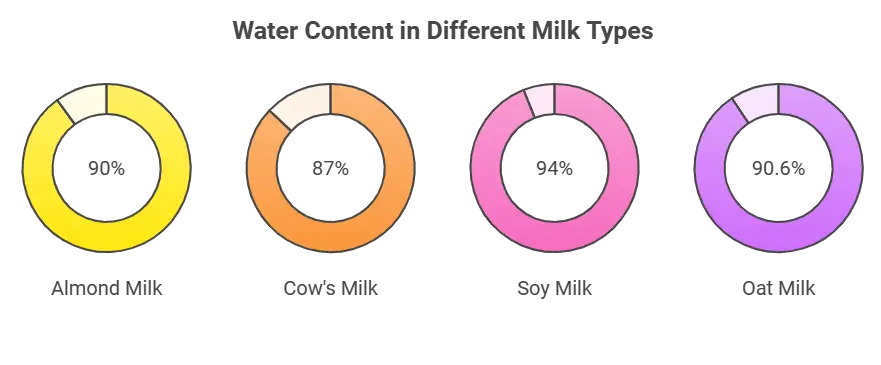If you’ve been drinking almond milk and suspect it might be linked to constipation, you’re not the only one with that question. So, does almond milk cause constipation? The simple answer is no, it isn’t naturally constipating. However, because it’s low in fiber, it may not do much to support regular bowel movements if it makes up a big part of your diet. Almond milk is lactose-free and low in calories, which makes it a popular health-conscious choice, but its limited fiber content can leave some wondering about its impact on digestion.
In this article, we’ll dive into the relationship between almond milk and constipation. We’ll explore the nutritional aspects of almond milk, debunk common myths, and provide actionable advice for anyone concerned about their digestive health. Whether you’re a long-time almond milk enthusiast or just considering the switch, this guide will help you understand how it fits into your overall diet.
Specific Discussion on Almond Milk
The Lowdown on Almond Milk
Almond milk has become a staple in many kitchens, especially for those looking to ditch dairy or simply explore new flavors. But before you pour that creamy goodness over your cereal or blend it into your morning smoothie, let’s take a closer look at what almond milk really brings to the table—especially when it comes to digestion. Spoiler alert: it’s not all sunshine and rainbows.
Fiber Content: The Missing Ingredient
One of the first things to note about almond milk is its fiber content—or, more accurately, the lack thereof. Unlike whole almonds, which are packed with fiber to help keep things moving in your digestive tract, most almond milk varieties contain little to no fiber. This is because the process of making almond milk involves straining out the almond pulp, leaving behind a smooth liquid that doesn’t quite measure up in the fiber department.
Additives and Ingredients: What’s in Your Glass?
Now, let’s talk about what else might be lurking in your almond milk. Many brands add ingredients like carrageenan, a thickening agent derived from seaweed, which can sometimes cause digestive discomfort for sensitive individuals. Additionally, preservatives and sweeteners may also be included to enhance flavor and shelf life. Always check the label to see what you’re pouring into your glass.
Brand Variations: Not All Almond Milk Are Created Equal
Different brands have varying compositions, which can make a big difference in how your body reacts. Some brands might fortify their almond milk with added vitamins and minerals, while others might focus on keeping it as natural as possible. For instance, unsweetened almond milk is generally a better choice for those looking to avoid added sugars that could upset digestion. On the flip side, flavored varieties—think vanilla or chocolate—can be delicious but may come with extra sweeteners that could lead to digestive issues for some.
Hydration and Almond Milk: Does It Quench Your Thirst?
The Importance of Staying Hydrated
When it comes to keeping our digestive systems running smoothly, hydration is key. Staying hydrated helps soften stools and promotes regular bowel movements, making it an essential factor in preventing constipation. But how does almond milk fit into this hydration equation?
Almond Milk: A Refreshing Alternative
Almond milk is often touted as a delicious, dairy-free alternative that can add some variety to your diet. But let’s be real: when it comes to hydration, it’s not exactly a water replacement. While almond milk does contain a good amount of water—typically around 90%—it also has some added ingredients that can affect its hydrating qualities. For instance, many brands include salt or sweeteners, which can contribute to dehydration if consumed in excess.
How Does It Compare to Other Options?

When comparing almond milk to other beverages, water still reigns supreme as the ultimate hydrator. It’s calorie-free, sugar-free, and doesn’t come with any hidden surprises. Now, if we throw some other milk alternatives into the mix, things get interesting.
Soy milk, for instance, is also mostly water and can provide a similar hydration effect as almond milk. However, it has the added benefit of protein, which can help keep you feeling fuller for longer. Oat milk, with its creamy texture and fiber content, is another contender that can contribute to hydration while also offering digestive benefits.
Then there’s cow’s milk, which is about 87% water. It’s a solid option for hydration, but for those who are lactose intolerant or prefer plant-based options, it might not be the best choice.
Addressing Myths and Misconceptions About Almond Milk and Constipation
Debunking the Plant-Based Milk Myth
Ah, the world of food myths—where misinformation spreads faster than a viral cat video! One common misconception is that all plant-based milk, including almond milk, can lead to constipation. This belief can leave many people scratching their heads, wondering if their favorite dairy alternative is secretly plotting against their digestive health. Spoiler alert: that’s not the case!
While it’s true that some individuals might experience digestive issues when switching to plant-based milk, it’s not a universal truth. Almond milk, for example, is low in fiber, which means it doesn’t actively promote regularity like some other foods do. However, it doesn’t automatically mean it will cause constipation for everyone. It’s more about how almond milk fits into your overall diet and lifestyle. If you’re enjoying a variety of fiber-rich foods, almond milk can be a delightful addition, not a digestive villain.
The Fiber Factor
Another myth floating around is that all milk must be high in fiber to avoid constipation. While fiber is essential for digestive health, not all beverages need to be fiber-packed to be considered healthy. Almond milk, as we’ve discussed, lacks fiber compared to options like oat milk or whole fruits. But that doesn’t mean it will block you up like a traffic jam at rush hour.
Think of it this way: if you’re eating a balanced diet rich in fruits, vegetables, and whole grains, adding almond milk to the mix won’t send your digestive system into a tailspin. So, if your diet is already brimming with fiber, almond milk can be a tasty complement rather than a culprit in your digestive drama.
Before You Go – Can Almond Milk Make You Constipated?
So, can almond milk make you constipated? The short answer is: it depends. While almond milk itself isn’t a direct culprit for constipation, its low fiber content and your overall dietary habits play significant roles in your digestive health. As you sip on that creamy, nutty goodness and add The Herb Prof to your favorites so you don’t miss any new articles, it’s essential to keep a few key points in mind to ensure your gut stays happy and healthy!
References – Can Almond Milk Make You Constipated?
Little Herb Encyclopedia, by Jack Ritchason; N.D., Woodland Publishing Incorporated, 1995
The Ultimate Healing System, Course Manual, Copyright 1985, Don Lepore
Planetary Herbology, Michael Tierra, C.A., N.D., Lotus Press, 1988
Handbook of Medicinal Herbs, by James A. Duke, Pub. CRP Second Edition 2007
The Complete Medicinal Herbal, by Penelope Ody, Published by Dorling Kindersley
Check the Following Articles!
Propagating African Violets in Water
How to Protect Plants From Slugs And Snails?
Herb Garlic Salmon: A Deliciously Simple Dinner Idea
